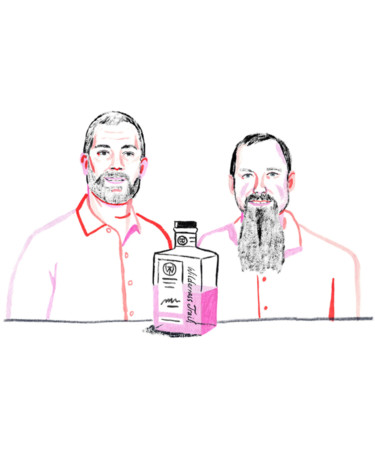This article is a part of our inaugural Next Wave Awards. For the full list of 2021 winners, check out the whole series here.
As the relentless pandemic drags on, it would seem like our spirit of the year should be something endemic to this strange era: the canned RTDs that have allowed people to slug Margaritas and more from home; the non-alcoholic “spirits” that helped stressed folks reevaluate their consumption; even the wonderful array of esoteric liqueurs and modifiers that assisted McMansion mixologists in shaking and stirring their way to quality cocktails. Yet our spirits brand of the year is a seemingly by-the-book Kentucky whiskey producer: Wilderness Trail.
Don’t get us wrong, though. Wilderness Trail is producing some truly extraordinary whiskey while still keeping an eye on the always-unpredictable future of the industry.
Over a decade into the craft whiskey movement, many of the earliest pioneers have had ample time to age their raw, grainy bourbons and ryes into something palatable; yet, even now, so few of them have become exemplary. Which makes you think that maybe maturation time isn’t everything.
Unlike many upstart brands started by people sourcing the same MGP “juice” as everybody else — and then contriving a questionable origin story and snazzy label — Wilderness Trail founders Dr. Pat Heist and Shane Baker come from plant pathology and microbiology backgrounds, having founded FermSolutions in 2006. The company supplies yeast strains (among other microbiological services) to over 600 breweries and distilleries. Fermentation is one of the most critical steps of whiskey production, yet so many big, heritage brands continue to use what they’ve used since their “grand-daddy’s day,” if not the same powdered distiller’s yeast as everyone else.
Hanging their distillation shingle in Danville, Ky., in 2013, Heist and Baker wanted their first release to be a bottled-in-bond bourbon (a requisite minimum of 4 years old), so they didn’t actually have whiskey on the shelf until 2018. Wilderness Trail has scaled up quickly, producing over 200 barrels a day, enough to get distribution to most states, all without the help of some massive multinational conglomerate.
It offers a variety of mash bills, including a bourbon, a wheated bourbon, and a rye, all produced using a sweet mash instead of the more typical sour mash process, feeling it creates a more consistent spirit that’s less prone to flaws and has a softer, more pleasant mouthfeel. The latter point is how Wilderness Trail is able to offer all its spirits at a higher proof, bottled-in-bond (50 percent ABV) at the least, with single barrels often checking in at full-proof 57 percent or so — though they’re never hot on the palate.
These private single-barrel “picks” have become particularly popular among online bourbon groups and even big retailers across the nation, like Julio’s Liquors just outside Boston. If owner Ryan Maloney was going all-in on Van Winkle single barrels back in the early aughts, today his affinity is for Wilderness Trail, having recently purchased six barrels from the distillery. And with bottles typically going for an economical $55 or so, they could one day end up being unicorns hiding in plain sight.
(Crypto bros dig them too, with Wave Financial Group working with the distillery to launch a digital fund, the first tokenized U.S. whiskey barrel fund available to the market.)
What’s most important during this time of relentless turmoil, though, is how Wilderness Trail recognizes that its agricultural product is inherently not going to exist as it currently stands if radical climate change continues unchecked. Last year, Dr. Heist — who speaks in an unexpected Bluegrass twang — gave a riveting TEDx Talk on the subject, explaining that, while fortunately Kentucky has undergone some of the least temperature change over the last hundred years, the other shoe will soon drop if we’re not all more mindful.
“The next time you’re sitting around sipping on your favorite bourbon whiskey,” says Heist, “hopefully you’ll think about the importance of climate to the quality of the whiskey, and how climate change might affect the quality and the price of whiskey going forward.”
It’s an unexpected alarm coming from someone speaking with a Southern drawl in the heart of red country — a state the former guy won by over 25 points in 2020 — and that’s what makes it all the more powerful.
